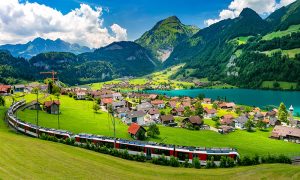In recent years, Poland has become the center of manyimmigrantsPoland is a top destination for expatriates, especially for young people and families looking for better life and career opportunities. As a member of the European Union, Poland attracts a large influx of expatriates not only because of its economic dynamism, but also because of its relatively low cost of living and well-developed social welfare system. In this article, we will analyze the latestPoland Immigrant VisaRequirements and immigration policies to help you through the immigration process.
I. Why choosePoland Immigration?
Poland, a key country in Eastern Europe, has experienced impressive economic growth in recent years. According to the World Bank, Poland's GDP continues to grow, its unemployment rate is relatively low, and its social benefits are becoming increasingly sophisticated. In addition, Poland's geographic location makes it a springboard into other European countries. Poland is culturally diverse and socially inclusive, providing a friendly living environment for immigrants.
For many, Poland is an immigration destination with high employment opportunities and quality of life. Whether you are an IT professional looking for a skilled job or an entrepreneur looking to start a business, the Polish market offers a wide range of opportunities. What's more, Poland's education system is of high quality, with many world-class universities providing excellent educational resources for immigrant families.
Two,Poland ImmigrationVisa Type
Depending on the purpose of immigration, Poland offers a wide range of visa types. Below are a few common types of visas, so you can choose the right one for your situation.
1. work visa
A work visa is the most common immigration route for those wishing to work in Poland. There are usually two types of work visas in Poland:
- Long-term work visas: This type of visa is available to foreign citizens who plan to work in Poland for more than 6 months. To obtain this type of visa, you need to obtain a work contract or a work invitation from a Polish employer.
- Temporary work visas: This visa is for short-term work (usually not more than 6 months) and is suitable for seasonal or temporary positions.
When applying for a work visa, you will need to provide documents such as a letter of sponsorship from your employer, academic certificates, proof of relevant professional qualifications and health insurance.
2. business start-up visa
If you are an entrepreneur, Poland's Startup Visa offers a relatively relaxed route for you. The Polish government encourages foreign entrepreneurs to invest and start businesses within its borders. Applicants are required to provide a valid business plan demonstrating that their business will create jobs and meet the needs of the Polish economy. In addition, applicants need to demonstrate that they have sufficient funds to support their entrepreneurial activities.
3. student visa
Poland is a major center of education in Europe and attracts a large number of international students every year. A student visa for Poland allows students to legally reside and complete their studies in Poland. When applying for a student visa, you will need to provide documentation such as an acceptance letter from your university, proof of sufficient financial means, and health insurance.
4. family reunification visa
If you are already a legal resident or citizen of Poland, you can apply for a family reunification visa to allow your spouse, children or other family members to legally reside in Poland. Family reunification visas usually require proof of kinship and proof of financial capacity.
Three,Poland Immigrationbasic requirements
Regardless of the type of visa you choose, Polish immigration requires that some basic conditions be met. Below are some of the generally applicable immigration requirements:

- language requirement: Although the official language of Poland is Polish, in some cases English or other foreign languages can be used as a language of communication. However, some visa types, such as work visas or long-term residence permits, may require the applicant to have a certain level of Polish language proficiency. In particular, when applying for a work visa, the employer may require the applicant to have a certain level of Polish.
- Proof of economic capacity: Whether you are applying for a work visa or an entrepreneurial visa, the Polish government requires the applicant to provide proof of sufficient financial means to ensure that you are not dependent on social welfare for your life in Poland. Typically, you will need to provide proof of bank deposits, pay stubs or proof of business income.
- health insurance: All foreign nationals are required to have valid health insurance when residing in Poland. This is one of the important documents that must be provided when applying for a visa.
- clean bill of health: Poland requires a high level of security for immigrants, and applicants are required to provide proof of a clean criminal record to ensure that you do not have a criminal history in another country or region.
IV. Applications for permanent residence and citizenship of Polish immigrants
The conditions for obtaining long-term residence in Poland are relatively relaxed. Generally, you need to have resided legally in Poland for at least five years, have no major criminal record during that time, and be able to prove that you have a stable source of income. After applying for a long-term residence permit, you will enjoy almost the same rights as Polish citizens, including social benefits, medical care and more.

In addition, if you wish to obtain Polish citizenship, you are usually required to have lived in Poland for ten years and during that time to have passed a test on Polish language and culture to prove that you have integrated into the local society.
Five,Immigration to PolandCaveat emptor
- cultural adaptation: Poland has a long history and a unique culture. It is crucial for immigrants to understand and integrate into Polish society and culture. Poles are conservative, but usually friendly. Learning the Polish language and understanding the local habits and work culture will help you to better adapt to life in Poland.
- cost of living: The cost of living in Poland is relatively low compared to Western European countries, but it still varies from city to city and region to region. Large cities such as the capital Warsaw and Krakow have a high cost of living, while smaller cities and rural areas in Poland have a relatively low cost of living.
- Legal compliance: Poland has strict immigration and work laws and it is vital to ensure that all foreign nationals comply with local laws and regulations. Any illegal work or stay may result in visa revocation or even deportation.
concluding remarks
Overall.Poland ImmigrationAn attractive option for those wishing to settle in Europe. With its growing economy, good job opportunities and relatively low cost of living, Poland is becoming a preferred destination for more and more immigrants. By understanding the latest visa requirements, immigration policies and related conditions, you can prepare yourself for a smooth start to your new life.






